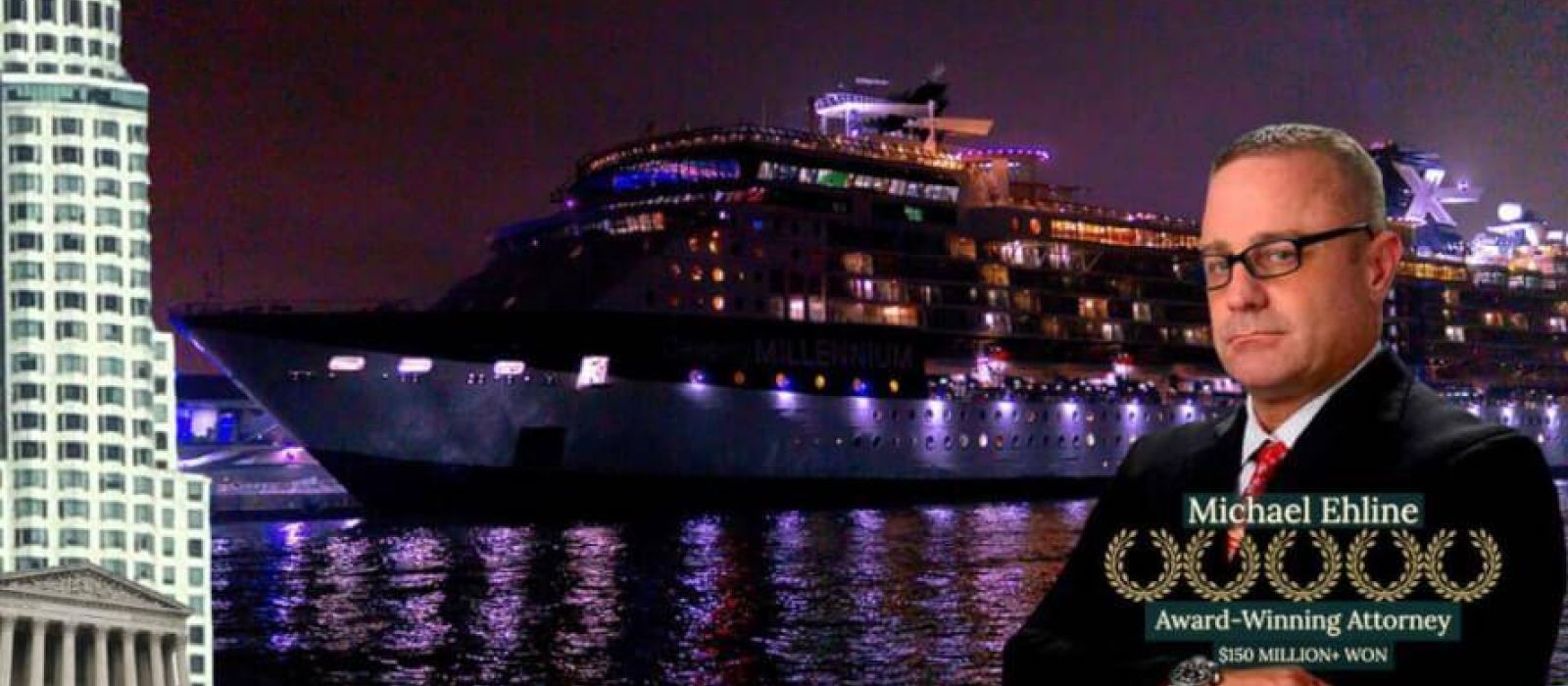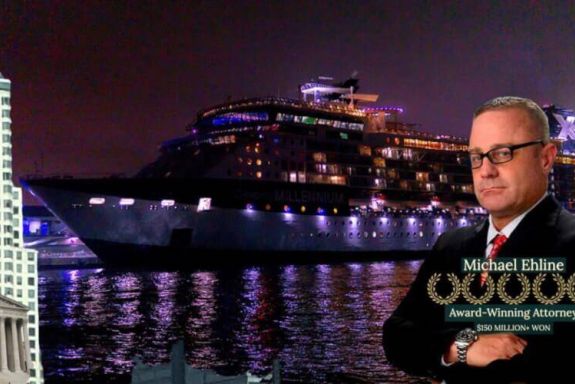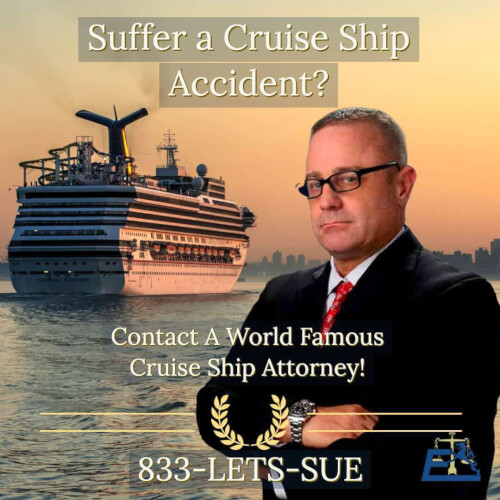

If we don’t win, you don’t pay.
NO WIN – NO FEE

ON CALL 24/7

U.S. Marine

Most cruise ship passengers never consider cruise ship injuries when boarding their Port of San Francisco, Port of San Diego, or Port of Los Angeles cruise ship. For most cruise ship employees or passengers seeking help, filing an injury claim is frightening and confusing.
Our Los Angeles cruise ship accident lawyers are here to assist you in any way we can. At Ehline Law Firm, our veteran injury lawyers will work closely with cruise ship passengers who have been injured to help them file a lawsuit per their passenger ticket.
We will work tirelessly and act quickly to assure the accident victims obtain the justice they are owed from insurance companies and others. Cruise ship victims have received millions of dollars from the efforts of our lead personal injury attorney and the injury lawyers on his team. Since 2005, our premier cruise ship accident lawyer has gloriously assisted international cruise victims.
We’ll fight hard to make the cruise ship company pay compensation for your cruise ship accident injury claims. Our law firm has over 30 years of combined maritime law expertise and is committed to obtaining clients with the highest financial recoveries. Accident victims who call us for free case reviews and form an attorney-client relationship will be fully prepared.
Why Choose Los Angeles Cruise Ship Accident Lawyers?
Our team handles all cruise accidents with urgency. We have recovered more than $150 million for our clients and work on a contingent fee basis. (zero fee guarantee) Michael Ehline can handle cruise injury cases in federal and state court and be invited in pro hac vice to co-chair instances in places like Miami, Florida, depending on the forum selection clause (Princess Cruises is L.A. based.) Find out with a free consultation if your case will be filed in California or Washington.
Free Consultation
Comments. Please message us from anywhere in the State of California. Describe your case with detailed information about any vessels or third-party vendors involved. * All Fields Required.
We don’t just sue Princess Cruises. Among the cruise lines our Port of Los Angeles personal injury law firm can sue include:
- Azamara Cruises
- Carnival Cruise Line (Carnival Corporation – owns Princess Cruises)
- Celebrity Cruises
- Costa Cruises
- Crystal Cruises
- Cunard Cruise Line
- Disney Cruise Line
- Holland America Line
- Mediterranean Shipping Cruises USA (MSC)
- Norwegian Cruise Line
- Oceania Cruises
- P O Cruises
- Princess Cruises
- Regent Seven Seas Cruises
- Royal Caribbean
- Seabourn Cruises
- Steiner Transocean.
Although not a comprehensive cruise defendant list, you can learn more in your free consultation.
Cruise Ship Injury Lawyer?
Because cruises provide so many legal advantages for businesses in the tourism sector, most legal cases can be challenging, often with no insurance company.
- Non-disclosure agreements seek to keep the names of those who are harmed, go missing, or die on cruise lines.
- United States courts lack jurisdiction over cruise ship crew members for incidents outside the recognized territory.
- Cruise lines refuse to accept responsibility for injured crew members and voyagers, as well as the bait-and-switch tactics to make cruise victims think their claim is invalid.
Our maritime lawyers in Los Angeles have a proven track record of overcoming these hurdles to ensure that accident victims profit from the legal framework of the domestic or foreign legal jurisdiction in a specific claim falls under. Our lead cruise ship accident lawyer understands the numerous bad-faith legal methods cruise lines use. Los Angeles cruise lines hate paying for accident cases, but we can help assure cruise ship accident victims receive their entitled benefits.
We Take Cases to Trial
We handle cruise industry mishaps that injure you or your family at sea. Our efforts at the Port of Los Angeles aim to improve your conditions. We will prepare and try your negligence lawsuits and give you peace of mind that your cruise ship accident case will be handled in your best interests. Our cruise ship attorneys also take the time to thoroughly and comprehensively examine the specifics of your case.
We’ll give your accident-injury case the personal attention you deserve, and an ethical, legal specialist will answer your questions and swiftly take action for injured clients. Our California law firm’s champion team works tirelessly to keep you fully informed about the progress of your case and the expected dollars in compensation for cruise ship accident victims.
The Cruise Ship Industry in a Nutshell
The cruise industry generated more than $42 billion for the U.S. economy in 2012, with economic activity supporting many types of jobs (350,000), generating $17 billion annually. The average kind of individuals to experience a trip will be 46-year-olds with an above-average household income of $93,000 annually. Travel aboard cruise ships has improved considerably. Many of the newer major cruise vessels field cutting-edge entertainment, with innovations such as Internet cafés, Wi-Fi zones, bowling alleys, rock-climbing walls, fitness centers, swimming pools, spas, wave machines, water slides, and other dangers placing many people at risk for lifetime injuries or wrongful death.
Important Things Voyagers Should Know
For the vast majority of cruise ship passengers, things work out. However, unforeseen events while aboard do arise at sea.
- The passenger ticket/boarding pass: You’ll typically receive a ten-page ticket with a tiny type. Could you read it? This ticket will impact several critical rights. What if you have ship injury claims due to the ship’s negligence? You must file a timely claim or be out of luck. Many people, including attorneys, assume injured passengers have longer to claim and finally sue. They are wrong!
Applicable Maritime Rules?
Don’t assume you’re in the United States on a cruise ship. Look at the vessel’s flag. You’re in the Bahamas if it’s Bahamian, and so on for Panama and so forth. There are some exceptions for a cruise ship accident. Our cruise ship accident lawyer can help.
- What About Medical Care On A Cruise Ship? Don’t count the ship’s doctor as a good surgeon or physician. Check with the cruise ship company if you have a health issue. Make sure standards are acceptable. Some are better than others. Never sail on a vessel that employs a psychiatrist to treat a broken arm or some catastrophic head injuries.
- What About Crimes At Sea? On cruise ships, you must understand how cruise ship companies have historically handled accident cases, virus outbreaks (Covid 19, etc.), and criminal incidents. Your children are also at risk on cruise ships. Make sure someone you trust is keeping an eye on your loved one. Young children have been sexual assault victims aboard cruise ships. Never open your cabin door, not even for cruise ship crew members, without checking first. Never think cruise line companies will protect your rights after a cruise ship accident. After a cruise ship accident, the cruise line company will protect its financial interest over its passengers. That is how it’s always been with cruise ships. Cruise ship employees will hamper your case compensation.
What To Do After A Cruise Incident?
You can protect yourself by snapping photographs. Get the names, addresses, and telephone numbers of all possible witnesses. If necessary, call injury lawyers from the high seas. We’ll find you an experienced law firm immediately to get advice about what you should do.
Where Do I File My Cruise Ship Injury Lawsuit?
Your cruise ship ticket or boarding pass will specify where your suit must be filed. Cruise ships contractually require wounded passengers to sue in Miami, Dade County, Florida. If you suffered injuries or emotional trauma on a Princess Cruise ship, you could file your lawsuit in federal or California Superior Court.
Examples of Cruise Accidents?
Over the years, our cruise ship injury attorneys have experienced several catastrophic accidents and felonies on cruise ships.
Some incidents were extremely public; others were ignored and sunk to the bottom of the sea, including running Aground, Crashing Into Objects, Ships, and Sinkings. The worst potential accidents are those that result in bodily harm. A grounding, collision, and even a partial capsize event might result in fatal injuries on cruise ships. Dehydration? Many passengers can be so dehydrated they are carried off the boat after days without food or water. Other Cruise Illnesses? An ocean liner can be a microscopic sample of germs and illnesses of society at large. On the upper or lower deck, Norovirus is the most prevalent disease suffered by cruise ship passengers and crew members. Poor Security: From departure to return, no person expected inadequate security.

Crimes At Sea? The most frequent type of crime reported is sexual assault. Robbery, bodily harm, and murder have all happened both onboard and ashore. In 2005, pirates with machine guns and hand grenades attacked the Seaborne Spirit off Somalia’s coast. Stormy and inclement weather may be to blame for an accident or collisions with other cruise ships. A trapped passenger dying during a partial sinking is a legitimate risk. Overserving Alcohol to passengers there to gamble, meet new people, and have fun can cause a passenger to fall overboard into the deadly sea. These are avoidable cruise ship accidents with proper supervision.
Requirements for Ships Registered in Foreign Countries?
Every cruise ship is registered in a different country and flies a foreign flag; regulations in foreign countries are always less favorable than U.S. laws. An incident on a boat that departs from Miami may fall under the purview of Florida state law, federal legislation, or the country where the vessel is registered. International treaties also apply to cruise ship accidents that take place aboard ships. Negotiating injuries without the right cruise ship injury lawyer is a nightmare.
Typical Cruise Ship Accident Claims?
Cruse law is a highly specialized practice area. Standard cruise ship injuries and wrongful death include:
- Cruise Ship Man Overboard (MOB) Falling Overboard Drownings
- Gangplank Accident (Slip and Fall Accidents)
- Cruise Ship Missing At Sea Disappearances
- Cruise Ship Swimming Pool Drowning
- Shore Excursion Recreation Accident
- Cruise Ship Tender Boat Accidents
- Cruise Ship Explosions or Fires
- Assaults and Rape
- Car Accident
- Dingy Accident.
Typical Cruise Ship Injuries?
We will work tirelessly to help you recover monetary compensation for all cruises departing or arriving at L.A.’s two ports, including:
- Deadly Viral or Bacterial Infections
- Traumatic Brain Injury
- Severe Burn Injuries
- Spinal Cord Injuries
- Wrongful Death
- Broken Ankle
- Broken Knee
- Food Poisoning.
Spinal cord injuries and head injuries from slipping on wet decks are standard.
Cruise Ship Law
Maritime law of the sea governs cruise ship accidents (unique combination of legal and standard carrier rules here.) Major cruise companies typically include special provisions in their passenger ticket agreements to limit the period during which a customer can file a lawsuit against a cruise line (Typically one year). In comparison, filing a lawsuit under admiralty laws takes three years. (Cruise ship crew members have other rules.)
Cruise Ship Accident Statute of Limitations?
A cruise ship employee won’t help resolve your severe injury case. The passage contract may restrict your lawsuit rights with rules and a time limit for filing a lawsuit to one year or less, even though the statute of limitations in an admiralty case is usually three years.
Important Cruise Resources:
- International Cruise Victims (ICV) – Dedicated to passing laws to protect rape, assault, and injury victims on cruises. Has led the way with Michael Ehline in safeguarding children and their families.
- Crimes Against Americans on Cruise Ships (FBI)
- Federal Maritime Commission (FMC) – Cruise Passenger Assistance. Competition and Integrity for America’s Seas.
- Guidance for Cruise Passengers (Department of Transportation)
- Travel Documentation (Department of Homeland Security)
- Obtaining a Passport (Department of State)
- Visa Requirements (Department of State)
- The Centers for Disease Control (CDC) regulates the health and sanitary conditions of cruise vessels operating in the U.S.
The U.S. Coast Guard (USCG) enforces maritime laws at sea and safety regulations and reports crime statistics.
- Cruise Ship National Center of Expertise
- Cruise Line Incident Reporting Statistics.
ehlinelaw.com Resources
- Cruise Ship Accident Attorney – Dedicated to increasing safety and holding cruise lines accountable.
- Top 8 Cruise Disasters – U.S. News.
- Sexual assaults on the high seas come under scrutiny – CNN.com – “… sexual and physical assaults were the leading crimes committed on board cruise ships in recent years, the FBI says.”
L.A. Cruise Line Help
Los Angeles:
- Port of Los Angeles – The Port of Los Angeles operates the World Cruise Center in San Pedro.
- Long Beach Cruise Terminal – Located in the nearby City of Long Beach.
- San Pedro.com – San Pedro is the home of The Port of Los Angeles World Cruise Center.
- Los Angeles Cruise Schedule – Ports America.
- Los Angeles Cruise Transfers – Ensure you arrive at the cruise terminal on time.
- Cruise Law Blog.
- Princess Cruises.
Receive a Free Consultation With a Cruise Ship Accident Attorney In Los Angeles
The attentive cruise ship accident lawyers at our Long Beach office will handle your injury claims on a contingent fee basis. You won’t pay anything unless we achieve successful compensation. Our leadership and legal advice cost you nothing upfront. Act Quickly and form an attorney-client relationship. Los Angeles cruise ship lawyers will come to you, or you can come to any of our convenient statewide offices or other locations, whatever your circumstances.
Our fully prepared, peer-rated attorneys will work tirelessly to defend your rights. We are available 24 hours a day, so contact us today for a free consultation about your potential accident case with a skilled attorney. Call us at (213) 596-9642 for case validation purposes.

